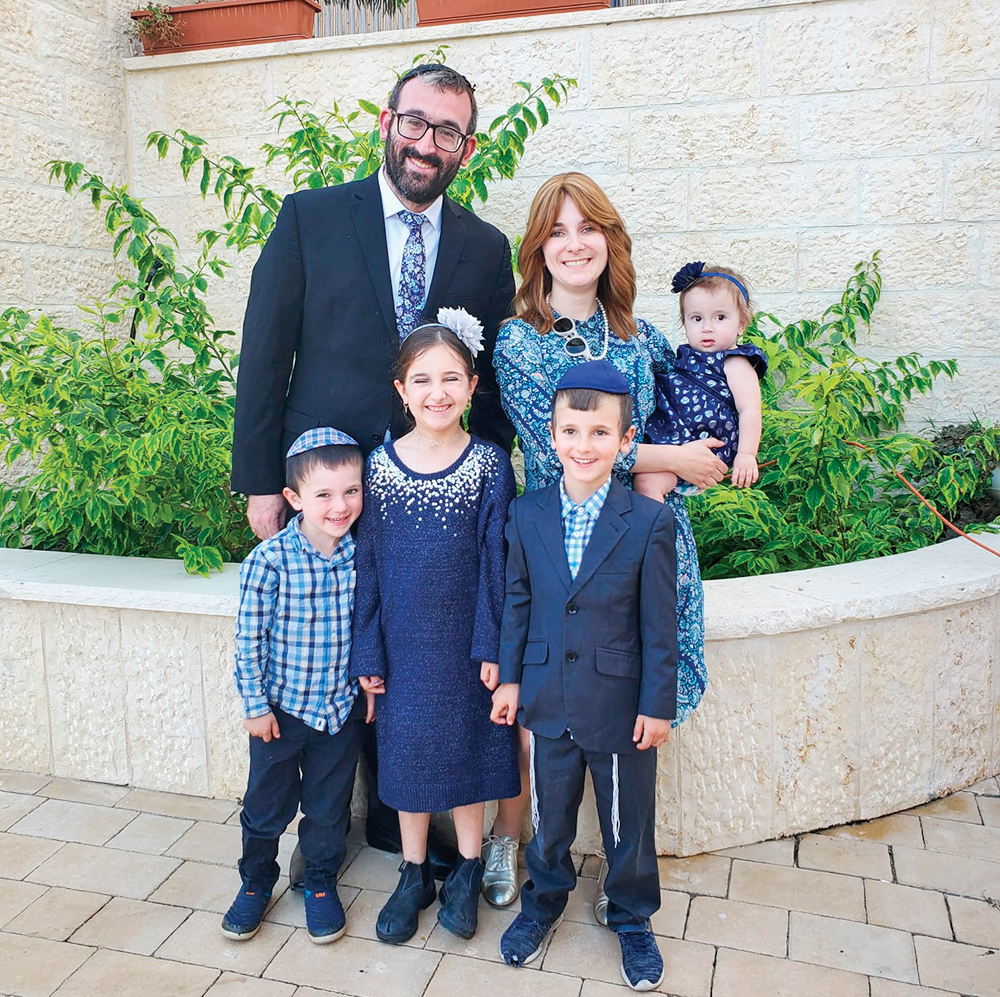
Ever since she was a student in the Bais Yaakov school system, Highland Park native Batsheva Weisinger has stood out for her academic achievements and intelligence. Already as a child she had ambitious dreams for herself, though some of these aspirations were looked down upon by her superiors who envisioned a different path for a religiously observant young girl. Weisinger did not allow these voices to stop her, and thanks to the encouragement of her parents and other mentors, she pursued a career of neuroscience, completing her bachelor’s degree at Stern College and her master’s degree at Hebrew University in computational neuroscience, focusing on the study of quantitative MRI.
A mother of four, Weisinger made aliyah with her husband and children in 2013. She is senior neuroscientist at Israeli start-up Brain.Q, where she plays a critical role in developing breakthrough therapy for restoring life after a stroke. The innovative product is a noninvasive electromagnetic field device that rests on the head of a stroke patient and will ultimately be controlled by an app on a mobile device. The purpose of this treatment is to stimulate and support brain functions that are necessary to promote recovery, while also providing a physical therapy regimen tailored to each patient’s medical condition.
Weisinger explained that most treatments for stroke patients are administered in the acute phase, a narrow window of time following the stroke when medical intervention is critical to restore blood flow to the affected area. Since significant progress has been made in advancing treatments in the acute stage, today there are many more stroke survivors being treated for injury. According to Brain.Q’s website, 50-70% of stroke survivors face chronic disability. “Our treatment is the first real change in post-acute treatment for stroke,” Weisinger said.
The technology works by activating the damaged neural networks responsible for brain function, based on machine learning tools that measure and retrieve biological insights from brain wave frequencies. When coupled with a tailored cloud-connected physical therapy program, the device further supports those activities responsible for recovery, promoting even greater improvement. The product is safe and noninvasive and can be administered at home. “One of the biggest barriers to care for chronic conditions is this oversight, having to go back to the doctor, having enough doctors, having enough physical therapists. The ability to provide a treatment almost fully remotely is going to be tremendous,” Weisinger said. This is especially true in low-income countries where access to care is often further compromised.
Weisinger oversees the product’s preclinical research, which includes collaborating with hospitals and universities to conduct trials to better understand how the treatment works. She designs protocols, conducts experiments and publishes results of the studies. She also manages clinical grants to obtain funding for studies in Europe. Brain.Q is working on obtaining CE status—the equivalent of the FDA in Europe—which the company hopes will be followed by full FDA approval. Clinical trials for stroke patients are taking place in over a dozen institutions around the United States, including Kessler Institute for Rehabilitation in West Orange. The technology can be applied to other neurologic conditions as well, which are also being tested.
An early tester of the product is Weisinger’s grandfather, one of the stroke survivors who tested the device before the clinical trials were launched. Weisinger was particularly moved to watch the device she spent so many hours designing and perfecting be tested by somebody so close to her. “I realized that all of these people are my grandfather, just to somebody else,” she shared. “It will hopefully be life-changing for a lot of people.”
It is this combination of what she calls “neuroscience with the human condition” that inspired Weisinger to follow this career path. “I knew I would end up in a research direction but at the same time, research that didn’t involve any kind of human element just did not seem satisfying for me. So I was looking for that perfect balance of research but that also involves humans.”
Weisinger is careful to fill her days with a variety of activities to nourish both her mind and soul. She aims to read a few books of classical literature every week, in addition to her daily studying of Daf Yomi and Nach. She is also involved with a group of parents in the launch of a new school in Jerusalem for children from charedi homes. Her dream is to one day retire to a farm and work the land.
Weisinger is very aware that her career path is not the typical journey for a Bais Yaakov graduate, and she hopes that she can be an example for other young people to dream big and not let stereotypes limit their visions. “The people who mattered most exposed me to a lot of different ways,” she said. “And because of that I am able to be a neuroscientist, and a Haredi woman, and a mother of four, and somebody who on the side is helping to build these schools, and somebody who on the side might live on a farm and have a cow. I know that if somebody tried to put me in a box it would be very hard. But to me, none of those things are mutually exclusive.”
For more information on Brain.Q visit https://www.linkedin.com/company/brainq-technologies/
Alisa Bodner is a Fair Lawn native who immigrated to Israel over a decade ago. She is a nonprofit management professional who enjoys writing in her free time.








